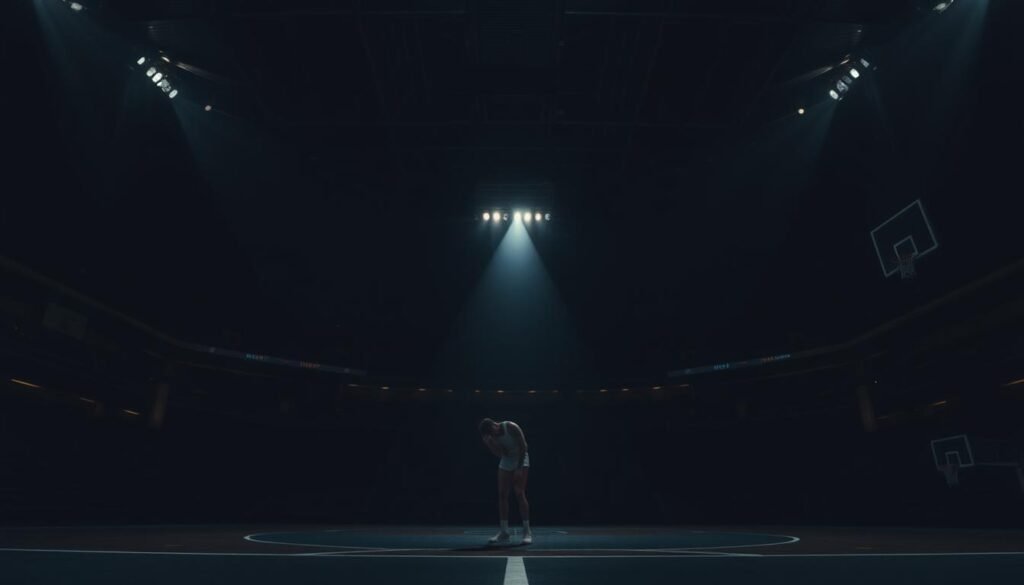What if failure wasn’t the opposite of success but a stepping stone to it? Dana Cavalea, former performance director for the New York Yankees, reveals that even professional baseball players fail 70% of the time. Yet, they thrive because of their systematic approach to growth.
Success isn’t about quick wins or overnight results. It’s about consistency and focusing on the process. Elite performers, whether in sports or business, understand this. They embrace failure as part of the journey, making micro-adjustments instead of seeking complete overhauls.
This mindset isn’t limited to athletes. Leaders in Fortune 500 companies and Olympians alike apply these principles. By prioritizing discipline and incremental progress, they achieve sustainable success. The 3:7 success-failure ratio isn’t a setback—it’s a foundation for growth.
Key Takeaways
- Failure is a natural part of the journey to success.
- Focus on the process, not just the outcome.
- Consistency is key to long-term growth.
- Micro-adjustments are more effective than complete overhauls.
- Athletic discipline translates to business leadership principles.
What is a Champion Mindset?
How do top performers consistently achieve greatness in their fields? It’s not just talent or luck—it’s a specific way of thinking and acting. This mindset focuses on consistency, process, and a deep commitment to improvement. Whether in sports, business, or creative careers, this approach separates the best from the rest.
Defining the Champion Mindset
At its core, this mindset is about embracing challenges and learning from failures. Take Tom Tellez, the legendary coach of Olympic sprinters. He emphasized “quiet effort”—focusing on steady, deliberate practice rather than flashy results. Similarly, Wayne Gretzky’s unstructured practice regimen allowed him to innovate and adapt, proving that over-coaching can stifle creativity.
Research from Northwestern University highlights the importance of balancing exploration and exploitation in creative careers. People who master this balance often achieve long-term success. This mindset isn’t just about surviving; it’s about thriving by staying action-oriented and resilient.
Why Consistency is Key
Consistency is the backbone of success. A study of 5,000 entrepreneurs found that those with day jobs had a 33% higher success rate. Why? Because they built habits and systems that supported their goals. The New York Yankees’ player development system is another example. It focuses on repeatable mechanics, ensuring players can perform under pressure.
Tony Hawk’s career is a testament to this principle. After burnout, he reinvented himself by focusing on what truly mattered. This cognitive fusion—aligning actions with values—helped him regain his edge. Kobe Bryant’s “Black Mamba” persona also shows how environmental priming can enhance performance. By creating a decorated workspace, productivity can increase by up to 60%.
In short, consistency isn’t about perfection. It’s about showing up every day, making small adjustments, and trusting the process. This is how people build a mindset that leads to extraordinary results.
The Role of Failure in Building a Champion Mindset
Failure is often misunderstood as the end, but it’s just the beginning of growth. In sports and beyond, failure is a reality that everyone faces. The difference lies in how individuals respond to it. Elite athletes and high achievers use failure as a tool to refine their skills and strategies.
Embracing Failure as a Learning Tool
Failure isn’t just a setback; it’s an opportunity to learn. Take Major League Baseball (MLB) as an example. Even the best hitters fail 70% of the time. This normalization of failure helps players focus on improvement rather than perfection.
Research shows that social support can increase pain thresholds, making it easier to handle setbacks. Aaron Judge, for instance, has a specific recovery protocol after strikeouts. This approach helps him stay mentally strong and ready for the next at-bat.
Examples from Elite Athletes
Michael Jordan’s brief baseball career is a testament to resilience. Despite not excelling in the sport, he used the experience to grow. Similarly, Navy SEALs undergo a 4-phase training program that integrates failure into their development. This process teaches them to adapt and thrive under pressure.
In Silicon Valley, tech leaders conduct “failure autopsies” to analyze mistakes and prevent them in the future. This method ensures continuous improvement and innovation. By embracing failure, these individuals turn challenges into stepping stones for success.
Winning the Mental Game: Emotional Control and Focus
Success in high-pressure situations often comes down to mastering the mental game. Whether it’s sports, business, or personal challenges, the ability to stay calm and focused can make all the difference. Emotional control and focus are the hidden keys to winning any challenge.
The Art of Emotional Control
LeBron James is a prime example of mastering emotional control. In the fourth quarter of games, he uses specific breathing protocols to stay calm under pressure. This technique helps him make better decisions in critical moments.
Research shows that smartphone proximity can reduce cognitive capacity by 18%. This highlights the importance of minimizing distractions to maintain focus. Navy pilots use the OODA loop (Observe, Orient, Decide, Act) to stay action-oriented during high-stakes missions.
Staying Action-Oriented
Kobe Bryant’s 4 AM film sessions contrast sharply with athletes who get distracted easily. His dedication to preparation ensured he was always ready for the game. Olympic decathletes use bullet journaling systems to track progress and stay organized.
Context switching can lead to a 40% productivity loss. A Stanford study found that multitasking can drop IQ levels equivalent to sleep deprivation. Warren Buffett’s “20-slot” rule emphasizes prioritizing actions to maximize efficiency.
By mastering emotional control and staying action-oriented, you can turn challenges into opportunities. This approach ensures you’re always ready to perform at your best.
Building Consistency and Commitment
Building consistency and commitment is the foundation of lasting success. Whether in sports, business, or personal growth, these principles separate those who achieve their goals from those who fall short. Coach Julian Robinson’s 1000-mile journey analogy illustrates this perfectly: every step, no matter how small, contributes to the final destination.
Creating a Daily Routine
A structured daily routine is essential for progress. David Goggins’ 4 AM challenge protocol shows how early starts can set the tone for the day. Similarly, Pat Riley’s Lakers “Threepeat” practice scheduling highlights the importance of deliberate, focused work.
Habit Stacking, a methodology from Stanford Behavior Lab, emphasizes building new habits by attaching them to existing ones. Jerry Seinfeld’s “Don’t Break the Chain” method contrasts with the Kaizen 1% rule, both aiming for incremental improvement. Research from UCL suggests it takes an average of 66 days to form a habit, reinforcing the need for patience and persistence.
Trusting the Process
Trusting the process means focusing on the journey, not just the outcome. Olympic trainers use “commitment devices” to keep athletes on track. Warren Buffett’s 5/25 rule helps prioritize actions that align with long-term goals.
Stephen King’s 2000 words/day writing ritual demonstrates the power of daily work. Neuroplasticity research shows that repeated practice strengthens neural pathways, making actions more automatic over time. By staying committed to the vision, you can achieve extraordinary results.
Surrounding Yourself with Like-Minded Champions
The people you surround yourself with can shape your path to success. Whether in sports, business, or personal growth, the right connections can accelerate your growth and potential. Research shows that strong social ties can reduce health risks by 50% and even increase lifespan. Building a network of supportive individuals is key to long-term success.
The Power of Mentorship
Mentorship is a powerful tool for accelerated learning. Tim Ferriss’ “5 Mentor” strategy emphasizes learning from diverse experts to gain unique insights. MIT Human Dynamics Lab research highlights the importance of communication patterns within a team. Effective mentorship fosters collaboration and innovation.
Mastermind groups, inspired by Andrew Carnegie’s era, bring together like-minded individuals to share ideas and solve problems. These groups create a sense of belonging and accountability. Unlike superficial networking, deep relationships, or “brain trusts,” provide lasting value and support.
Finding Your Tribe
Finding your tribe means surrounding yourself with people who share your values and goals. The Navy SEAL buddy system shows how strong partnerships improve survival rates. Y Combinator’s cohort model demonstrates the power of collaborative environments in business acceleration.
Social connections also impact professional success. Data shows that strong ties lead to a 78% higher chance of salary increases compared to weak ties. The Dunbar Number suggests maintaining a manageable network of 150 meaningful relationships for optimal growth.
By building a supportive team and fostering a sense of belonging, you create an environment where everyone thrives. Surrounding yourself with like-minded champions ensures you’re never alone on your journey to success.
Conclusion: Taking the First Step Toward Your Champion Mindset
Every great achievement begins with a single step toward your vision. Whether it’s a personal goal or a lifelong dream, the journey starts with action. Research shows that small, consistent efforts compound over time, leading to extraordinary results.
Visualization techniques, like those used in Olympic training, can boost performance by 21%. The “premortem” strategy helps anticipate challenges, ensuring you’re prepared for obstacles. By focusing on 1% daily improvements, you can achieve a 37x annual gain in progress.
Commitment is key. Elite military units like Navy SEALs thrive during “Hell Week” by pushing their limits. Jocko Willink’s philosophy, “Discipline Equals Freedom,” reminds us that consistent effort unlocks potential.
Take the first step today. Start with a clear vision, build consistency, and surround yourself with supportive people. For deeper insights, explore the Athletics of Business podcast and continue your journey toward success.
FAQ
What does it mean to have a champion mindset?
A champion mindset is about focusing on growth, staying committed to your goals, and embracing challenges. It’s a way of thinking that prioritizes effort, resilience, and learning over immediate results.
Why is consistency important in achieving success?
Consistency builds habits and momentum. Small, repeated actions over time lead to significant progress. It’s the foundation of long-term achievement in any field, whether in sports, business, or personal growth.
How can failure help in developing a champion mindset?
Failure is a powerful teacher. It provides valuable lessons, highlights areas for improvement, and strengthens resilience. Embracing failure as part of the journey is essential for growth and success.
What role does emotional control play in achieving goals?
Emotional control helps you stay focused and make clear decisions, even under pressure. It allows you to manage stress, setbacks, and distractions, keeping you on track toward your objectives.
How can I build a daily routine that supports my goals?
Start by identifying key habits that align with your vision. Prioritize tasks, set specific times for them, and stick to the schedule. Over time, this routine will become second nature, driving progress.
Why is surrounding yourself with like-minded people important?
Being around motivated individuals inspires and pushes you to grow. They provide support, share knowledge, and help you stay accountable, creating an environment that fosters success.
How can I stay action-oriented when facing challenges?
Break tasks into smaller, manageable steps and focus on one at a time. Stay present, avoid overthinking, and remind yourself of your purpose. Taking consistent action builds momentum and confidence.







